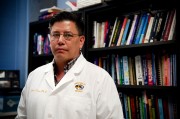The Sound of Melanoma Can Help Doctors Find Cancer
Photoacoustics technology could make some lab processes more efficient, says MU researcher
February 23rd, 2010
Photoacoustic Detection of Melanoma in Lymph Nodes from MU News Bureau on Vimeo.

John Viator, assistant professor in the Department of Biological Engineering and Department of Dermatology.
COLUMBIA, Mo. – Knowing the stage of a patient’s melanoma is important when choosing the best course of treatment. When the cancer has progressed to the lymph nodes, a more aggressive treatment is needed. Examining an entire lymph node for cancer takes much effort and time; a new technique might help make the process more efficient. University of Missouri researchers in the Christopher S. Bond Life Sciences Center are studying how photoacoustics, or a laser-induced ultrasound, could help scientists locate the general area of the lymph node where melanoma cells could be residing. This new technology could help doctors identify the stage of melanoma with more accuracy.
“This method can be used to determine if the cancer has spread from stage 2, where the melanoma is still just in the skin lesion, to stage 3, where the melanoma has spread to the lymph nodes,” said John Viator, assistant professor in the Department of Biological Engineering[1] and Department of Dermatology[2]. “If the cancer is still at stage 2, a simple procedure can remove that lesion. If the cancer has progressed from the initial skin lesion into the lymphatic region and possibly the bloodstream, doctors have to make serious decisions about patient care. The cancer may have possibly spread to other organs, such as the liver, lungs or brain.”
Currently, pathologists must perform several specific and detailed tests to determine if there is cancer in the lymph nodes. This new technology could make the search less time-consuming by identifying a general area of the lymph node that might contain cancer.
“It’s very similar to identifying a prize inside a cake,” Viator said. “Instead of looking through the entire cake, we can use our ultrasound to pinpoint a slice or two that might contain the ‘prize.’ In the case of the lymph nodes, when you get a signal, this alerts the pathologist that this is an area of the node that might contain cancer cells. At that point, a pathologist would be able to narrow down the search, saving time and money.”
In the photoacoustic method, a tabletop device scans a lymph node biopsy with laser pulses. About 95 percent of melanoma cells contain melanin, the pigment that gives skin its color, so they react to the laser’s beam, absorbing the light. The laser causes the cells to heat and cool rapidly, which makes them expand and contract. This produces a popping noise that special sensors can detect. This method would examine the entire biopsy and identify the general area of the node that has cancer, giving pathologists a better idea of where to look for the cancer.
“This method is quicker and simpler and could be used to improve the efficiency of how doctors determine if the cancer has spread from the original skin lesion into the lymphatic system,” Viator said. “This technology could be an important tool in our fight against cancer.”
In the study, Viator took human cancer cells and placed them inside canine lymph nodes. Then, using the laser, he determined the best ways to locate the cancer cells. The next step is to try the procedure using human lymph nodes.
The study, “Photoacoustic Detection of Melanoma Micrometastatis in Sentinel Lymph Nodes,” was published in the Journal of Biomedical Engineering.
[1] The Department of Biological Engineering is part of the College of Engineering and College of Agriculture, Food and Natural Resources
[2] The Department of Dermatology is part of the School of Medicine.


 Photos (2):
Photos (2):